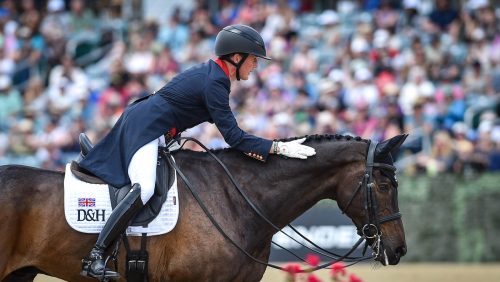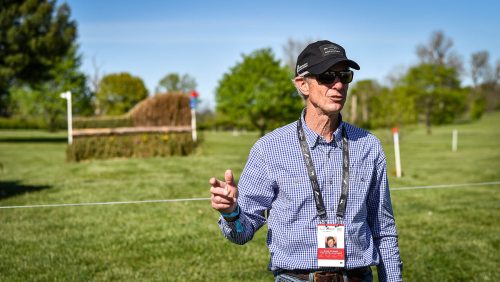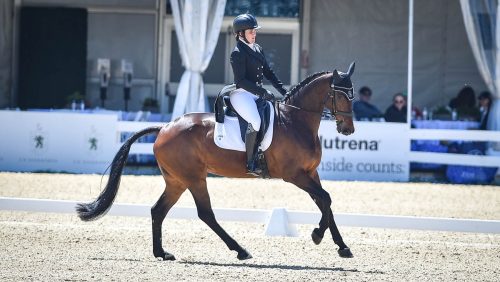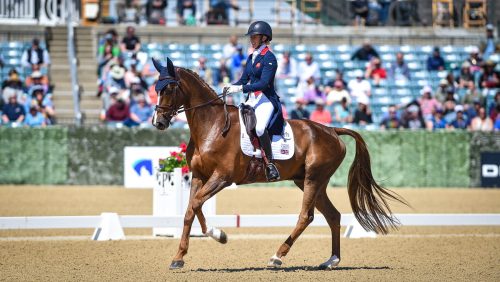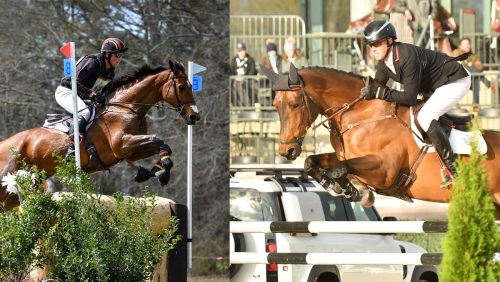Few riders have captivated the sport of show jumping like Greg Best did with the legendary Thoroughbred Gem Twist.
Best, originally from Lynchburg, Va., partnered with the gelding as a 5-year-old in 1984, and the two skyrocketed up the grand prix ranks together. Aboard “Gem,” the only horse to win the American Grand Prix Association Horse of the Year title three times, Best famously won both individual and team silver medals at the 1988 Olympic Games in Seoul, adding to their team silver medal from the previous year’s Pan American Games in Indianapolis (Ind.). At the 1990 World Equestrian Games in Stockholm, Best and Gem finished fourth individually, and Gem was received the prestigious title of Best Horse of the Games.
Best’s grand prix career ended in 1992, however, when a fall from Gem shattered his shoulder. Two years later, he moved to New Zealand, where he now owns the Silverstream Station farm in Otane, New Zealand, with his wife, Kim, and their two children. Kim is a trainer as well, and they run a training and sales business while Greg has built up a thriving worldwide clinic schedule.
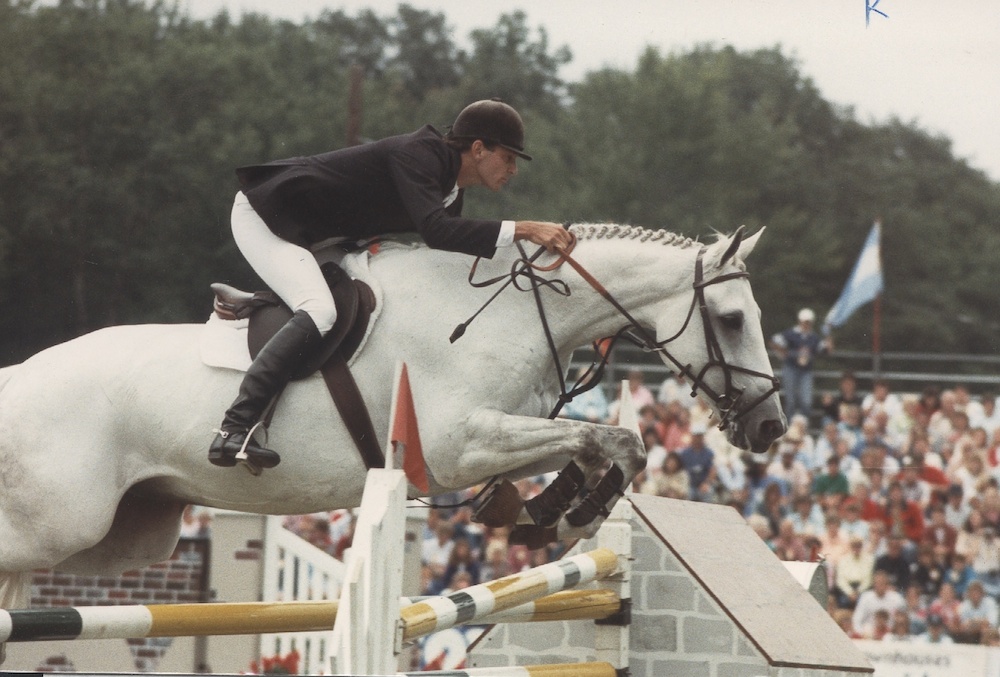
Greg Best aboard Gem Twist. Photo by Samantha J. Bennett
Greg has also served many roles for the country’s national show jumping and eventing teams. He coached the New Zealand show jumping team at the 2004 Athens Olympic Games and was a team selector and member of the New Zealand Show Jumping High Performance Committee.
Greg recently revealed that he will be returning stateside on a more permanent basis in May 2017, as he has accepted a position as the head coach of the riding program at the Dana Hall School, an independent boarding and day school for girls in grades 5-12 in Wellesley, Mass.
About 100 students participate in the riding program at Dana Hall, and the school’s equestrian center, named for the late Karen Stives, a school alumna and 1984 Olympic team gold medalist and individual silver medalist in eventing, houses 45 horses. Stives played a large part in recruiting Greg to teach clinics at Dana Hall; he has periodically visited the school as a clinician since 2012.
Greg will now spend at least six months of his year in the United States and return to New Zealand for the other six months. Prior to taking up his full-time position, he will host two clinics at the school, one in August and a second in September.
The Chronicle caught up with Greg to talk to him about his new job and his homecoming.
COTH: How did this opportunity come about?
GB: Sarah Summers is the director of the riding program. She’s going to be my boss, which I’m scared of, because I’ve never had a boss ever in my life! The idea of being an employee and having a boss to answer to is a very frightening thing—the good thing is, she’s a very unfrightening person!
Sarah and I were discussing [retiring head coach Cookie DeSimone’s] impending departure from Dana Hall. Cookie had spoken with Sarah for some time about the fact that this was probably somewhere on the radar, so Sarah and I had spoken several times about how I would be quite happy to be involved peripherally with the process of trying to find Cookie’s replacement.
At the same time, I had told her that I was looking to try to find some sort of a situation where I wouldn’t have to carry on with the crazy traveling I had done for the past 20 years [teaching clinics]. I have a 9-month-old daughter [Pippa] and a 3-year-old son [Will]. I’m one of those crazy people that wants to do things really well, and my current obsession that I really want to do well is be a great father and a great husband. I just know that being the best that I can be regarding that doesn’t include being away from them for half the year!
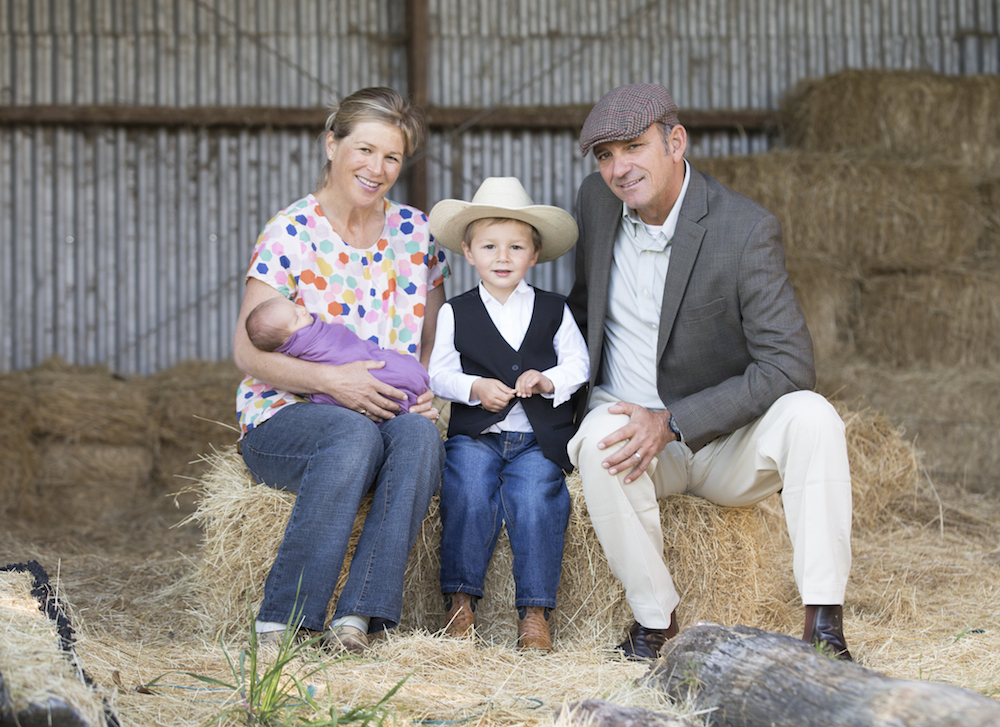
Greg Best (right) with wife Kim (left) and their children, Will and Pippa.
So at some stage, one of us said, “If Cookie is leaving, and you’re looking for something that might be able to keep you in one place, I wonder if that one place could be Dana Hall?” We talked about it a little bit more and thought, “Maybe this could happen.”
It’s sort of been a work in progress for a while. We first thought about the possibility of it being a year-round thing, but it wasn’t really something that was going to work for my family. My wife [Kim] has a lot of family in New Zealand, and her father lives on the farm with us. I’m very mindful of making sure that she’s happy, and I’d like my kids to spend at least half the year in New Zealand as well, because it’s a huge part of who they are.
We decided that maybe the year-round thing wasn’t going to work for everybody, so we concocted this idea of trying to do something full-time but part-time—full-time in overseeing the program even during the six months of the year when I’m not there and obviously for the other six months being very hands-on while actually being there full-time.
ADVERTISEMENT
It was a sort of funny evolution of how it all sort of came about. It wasn’t something where I approached them or they approached me. It was just something where we had spent enough time together and later saw the obvious. The mind is just racing thinking about all the possibilities.
I’m devastated that Cookie is not going to be there and help me with this transition. She’s a really wonderful person. She’s very quiet, very understated and extremely well respected by the whole community. I was hoping I could follow her around and be in her shadow for the first year, but she will be involved a little bit—but not nearly as much as I wish I was going to have her involved.
How did you first get involved with Dana Hall?
Years ago in New Zealand, I had what we used to call an equestrian homestay program, and one of the people that came for a week and stayed with us and rode with me was a woman that had some involvement with Dana Hall. Her name was named Stephanie Ault, and she was the one that sort of talked [the school] into organizing for me to do a clinic there. This would have been about five years ago.
The first year, I might have done one clinic, and then that sort of grew to two clinics. This year was all planned before there was any decision for me to be there full-time, but this year I will have been there five times before the end of the year. It’s all been a very gradual thing.
Immediately, I recognized that the relationship between myself and Dana Hall was a really good relationship. They’ve always looked after me well when I was there, and the kids were incredibly receptive and respectful. Cookie would just sit in the corner and listen and just set such a good example for the kids and the other instructors. It was just such a well-received process. A big part of why I’m going there is because the clinics were such a positive experience for me. I think they probably feel the same way, but it was a very fulfilling process for me, too.
What will your schedule be like?
I’ll be at Dana Hall from May through November. My wife and kids will probably come over for somewhere between four and five months of that time.
We were trying to figure out time-wise, if I were to spend six months there, what would make the most sense? I think we came up with the best plan. It was trying to almost think in terms of trying to get through those equitation finals and through indoors and working six months back from there. That’s going to put us back to the middle of May.
That was the timeframe that we ended up working out, and I think it’s going to work well. It certainly works well with the show season, but that’s certainly very separate from the academic school year. My job is to make sure there are good programs and processes in place to cover those other months as well.
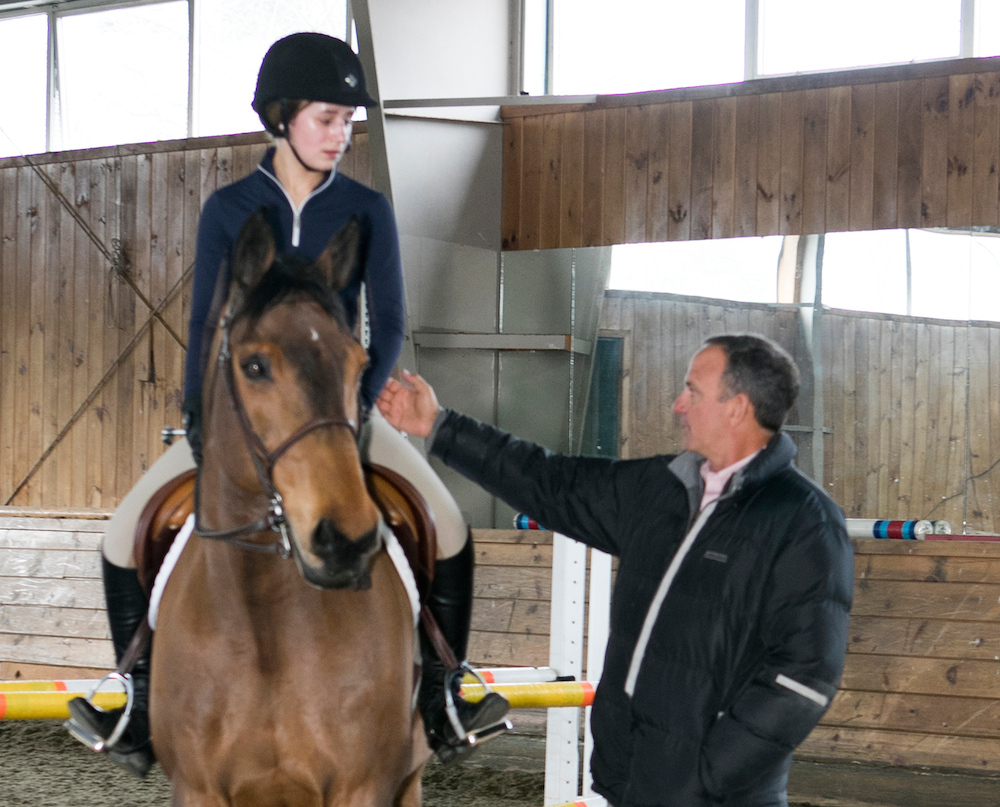
Greg Best (right) teaching a student in a clinic at Dana Hall. Photo by Tracy Emanuel
There are really two parts to what we’re going to be doing: We’ve got the school year, which I’m only there for part of that, and then there’s going to be some sort of a summer training academy, which will primarily be for the Dana Hall students, but there are going to be a few outside slots as well for riders to come and spend the month with us and be part of our summer program. That summer program is potentially going to be something that’s going to be really unique.
We’re a little bit limited during the school year as far as what we can do, because I have to remember that the kids are actually there to go to school, and really we’re just sort of an extracurricular activity!
That’s a little bit hard for me to wrap my head around sometimes. I’m only a very, very small part of these kids’ education. But the summer training academy that we’re hoping to create is going to be something that’s going to be very different from that. It will be a very full immersion-type program that I’m really, really looking forward to.
Do you plan to ride or show at all?
I haven’t ridden and haven’t shown in probably nearly 11 years. I’ve used the excuse of having to travel so much. I just thought it’s been too hard to do the traveling that I’m doing and just be a part-time rider after not having ridden for [so long].
I no longer have that excuse. I went out and bought a new saddle, and I went out and bought a new pair of breeches. I’m starting to assemble the gear, because now I don’t really have any excuses. It’s another aspect of what we’re going to be doing that I’m really looking forward to.
ADVERTISEMENT
I’m not really sure [if I’ll show]. I’m going to take things one step at a time, but I’m really excited about starting to ride again. I just want to get back into the riding and see if it eventually leads me back into the ring. My goal is to get back in the saddle and see if I can get myself a little healthier and a little fitter and see where it leads me eventually.
I think it would be a fun thing for the kids and for myself and my family. Sarah has said that I could always have a stall there for a horse of my own if I wanted to.
What are your plans for your farm in New Zealand?
We’re still really old fashioned. The show season in New Zealand is probably only about six months long. The shows start in the beginning of October and run through early April. For the rest of the year, the horses don’t do much.
What we do, as soon as we’re done with the last show, the shoes come off and the horses live out in the paddock. I think it’s healthiest thing in the world for the horses. They get a chance to go out and play around and live on their own and do their own thing. So for those six months that we’ll be over here, the horses will basically live in the paddock and be horses.
We’re really lucky. We have an 80-acre farm. It’s not huge, but it’s big enough, and the paddocks are all about 10 acres each. The horses just live out there and are very content and happy out there. Living in New Zealand has reminded me a little bit about how things used to be done.
What do you hope to achieve with this program at Dana Hall?
For the last 15 years, I’ve been able to go to various places and have what seems like, for three days, is quite a profound impact on a handful of people around the world. To be able to have more of a long-term effect on some people is something I’m really looking forward to, to see how my approach actually works.
To be honest, I think that’s a mystery for myself and probably a little bit of a mystery, soon to be answered, for Dana Hall, too—to see whether my approach to riding, training and the community I look forward to creating at the school is as healthy and exciting as I think it will be. It is something that’s very much going to be a program that’s going to evolve.
What will you focus on in your training program with your students?
My teaching isn’t about showmanship; it’s about horsemanship. That would be the one thing that I think really defines my approach to training.
I’m definitely not anti-hunters or anti-equitation or anti-jumpers or anti-eventing or dressage or anything like that. My approach is just sort of a very basic approach to horses that doesn’t really take into consideration what the people are aiming to do competitively. I treat hunters the same way that I treat jumpers, the same way I treat eventers.
It’s all about trying to get better connected with your horse, understand what motivates your horse and trying to get the horses to try to perform to the best of their ability, almost exclusive of what their job is at a horse show. It’s really about educating.
I want to teach these kids to be the best horsemen that they can be, and in the process of doing that, I think we’re going to produce some pretty competitive kids.
What are you most looking forward to about living in the United States again?
I get to spend a lot of time [in the United States] anyway [when I’m traveling to teach clinics]. The two really unique things that we’re about to do is that I’ll get to spend the six months of year [that I’m normally traveling away from home] with my family, and I’ll get to do it with a group of people that I’m really looking forward to being associated with.
I really feel like what I’m hoping to do with these students and the rest of the staff at Dana Hall is absolutely going to be my legacy. This is what people will hopefully remember me for. I think it’s going to be big, and I think it’s going to be really, really exciting.







